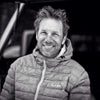Hollywood Knocks Off ‘Everest’ at Last
Does the catastrophe that gave us 'Into Thin Air' still have the power to captivate? We talk to the cast and crew of the new movie 'Everest' about making an adventure epic roar to life for a new generation.
New perk: Easily find new routes and hidden gems, upcoming running events, and more near you. Your weekly Local Running Newsletter has everything you need to lace up! .
There are plenty of arresting visuals in —mountaineers plummeting into the abyss, massive avalanches, a high-altitude superstorm, Keira Knightley—but the best scene is one of the quietest. In a dimly lit mess tent, climbers huddle around a dinner table, sipping chhaang from tin cups, when journalist Jon Krakauer (played by actor Michael Kelly) hits his crew with the money question.
“It hurts, it’s dangerous… Why are you doing this?” he asks. No one provides a good answer, and the awkward exchange is one of the most believable moments in the action flick, which rips along like Mad Max hitting the Himalayas.
Producing the $55 million feature film, which opens on September 18, was an adventure in itself. Much of it was shot on location in Nepal and Val Senales, a ski resort in Italy’s Dolomites. Longtime Everest guides David Breashears, Guy Cotter, and David Morton were on board to provide mountain footage and consult about safety and climbing details. Some scenes in Nepal were filmed as high as 16,000 feet, while in the Dolomites the cast and crew were airlifted by helicopter into avalanche-prone terrain. “This project attracted people of similar minds,” Jake Gyllenhaal told me. “You don’t just have actors sitting in their trailers. You have people who are physical and want to do some crazy shit.”
The events in ’96, in case you’ve forgotten, detailed in numerous first-person accounts, including Krakauer’s wildly bestselling book , involved two accomplished guides, Kiwi Rob Hall (Jason Clarke), who ran the climbing outfitter �����ԹϺ��� Consultants, and American Scott Fischer (Gyllenhaal), owner of outfitter Mountain Madness, and their respective expeditions. It was the dawn of commercial climbing on Everest, and though the two men were friends away from the mountain, here they were competing for clients, media exposure, and money. On May 10 of that year, a series of controversial decisions, along with a little bad luck, left both teams stranded in a lethal storm above 26,000 feet, in the so-called Death Zone, where oxygen is almost nonexistent and humans can’t survive for long.
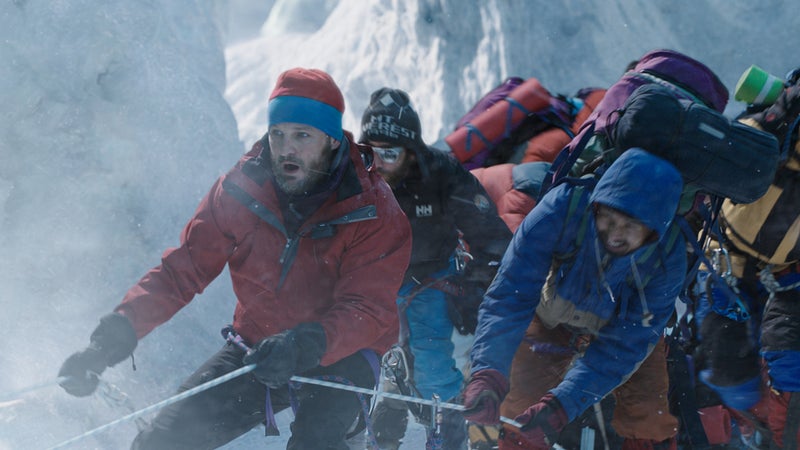
The saga of the rescue attempts and of the eight people who died that day would become one of the greatest stories in modern adventure history. There was the colorful collection of amateur climbers: a mailman from Seattle named Doug Hansen (John Hawkes), who was pinned down at 28,000 feet with Rob Hall during the storm; ambitious Texas doctor Beck Weathers (Josh Brolin), who was left for dead on the South Col, only to rise, Lazarus-like, from a frozen hell to somehow stagger back to camp. And few moments in mountaineering lore are more heartrending than the final radio calls between Hall and his pregnant wife, Jan Arnold (Knightley), back in New Zealand, during which, sensing her husband’s fate, she tried to coax him into descending.
Surprisingly, Into Thin Air never made it into theaters. It was quickly adapted into a 1997 low-budget TV groaner. A big-screen documentary about the mountain appeared in 1998, the McGillivray Freeman Imax movie , which was shot and co-directed by David Breashears. The 48-minute film became the highest-grossing Imax production in history, but it only briefly touched on the ’96 tragedy, even though Breashears had been filming on Everest at the time and helped rescue the injured.
Hollywood has long struggled to produce a climbing film that plays well with both general audiences and those who know something about mountaineering. The nuances are often lost, the visual effects laughable. Studios have lured audiences by introducing far-fetched elements—an assassin (), a heist (), nitroglycerin (), Brad Pitt (). When filmmakers get the narrative right—like, say, in the docudrama or the more recent German feature film —the movies find a cult following at best.
Everest may be the first big-budget attempt to let a climbing story stand on its own. Producer Tim Bevan (Fargo, The Big Lebowski) and director Baltasar Kormákur (Two Guns, Contraband) were committed to hewing close to the facts and letting the drama of the event do the work for them.
In April, I sat down with Brolin, Clarke, and Gyllenhaal in Los Angeles for a lively roundtable discussion about their experiences on the project. Later, I caught up with Kormákur, Breashears, and others about the long journey to bring Everest to completion.
The Early Days
Universal made substantial investments in an Everest movie in the late 1990s and early 2000s, including optioning Beck Weathers’s book and the transcripts of the radio calls between Rob Hall and Jan Arnold. The studio also commissioned a script, conducted extensive background research, and had noted mountaineers Ed Viesturs and David Breashears (who was brought on as a co-producer) do some filming. But securing financing, a director, and a cast would take several more years. In 2004, Stephen Daldry (Billy Elliot) was set to direct, but for various reasons the project foundered and was shelved until 2009, when producer Tim Bevan recruited screenwriter Bill Nicholson (Gladiator) to craft a new script.
TIM BEVAN (producer and cochairman at Working Title Films, a production company owned by Universal): What happened with Daldry is that we got lost under the weight of all the material, trying to tell too many stories. With Bill, we said, “Let’s simplify. Let’s make it about �����ԹϺ��� Consultants. Let’s make it about a guy who was up there who shouldn’t survive but does, and about a guy who absolutely should survive and doesn’t.” And that’s Beck Weathers and Rob Hall. It was a spare, quite clinical way to approach the screenplay, but it needed that, because otherwise it was too multiheaded.
EVAN HAYES (former executive at Working Title): Our validation came when we sent the script to Christian Bale. When Bale said yes, we were like, Yeah, this is happening. Because you’re always asking, Can you attach cast? We couldn’t make it work with Bale, but then we started thinking that this may be better as an ensemble.
“This project attracted people of similar minds,” Gyllenhaal says. “You have people who are physical and want to do some crazy shit.”
DAVID BREASHEARS (coproducer): I was brought on in 2003 to film and to serve as a consultant and adviser: What was it like to be on the mountain? How did people move? What was Base Camp like? And Camps 2, 3, and 4? What did someone feel like and act like at altitude? In 2004, we climbed and reached the summit. We came back with what I thought was a lot of very compelling footage. Then the project was put on hold. It was never given up on, though. The biggest champion of this film has been Tim Bevan. He refused to let the project die. Everything started coming back together again about two years ago.
Getting the Director On Board
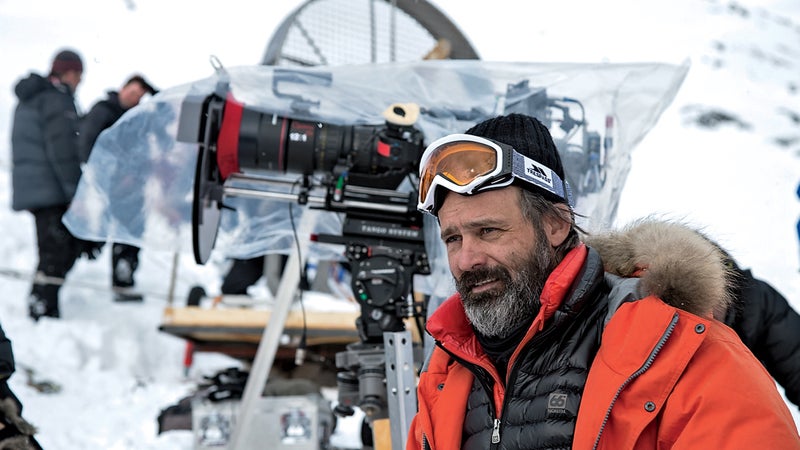
In 2011, with the new treatment in hand, Bevan called Baltasar Kormákur. The Icelandic director had impressive cred. His 2013 film The Deep, based on a true story about a capsized fishing boat and its lone survivor, was short-listed for a foreign-language Academy Award. And he helmed the successful 2012 action movie Contraband, about two drug-dealing brothers, starring Mark Wahlberg. Kormákur is also a passionate adventurer and world-class sailor. It was the skill set the studio sought: a real-life outdoorsman with experience directing a technical project, the ability to keep a complicated shoot on budget, and a firm idea of the story he wanted to tell.
BALTASAR �������Á������: Tim and David had a relationship before I came. But here’s the thing, and this is very important for me. No one—it doesn’t matter who it is—is going to tell me what the plot is going to be. David was a really good pal at the end of the day. He was supportive and tried to give ideas and help the actors. He was helpful with the Sherpas. He was a little shocked when he saw who was going to play him [Micah Hauptman]. I was like, “Who do you think, George Clooney?”
GUY COTTER (mountain and safety adviser, current owner of �����ԹϺ��� Consultants, and friend of Rob Hall who assisted in the 1996 rescue attempts on Everest): There are multiple versions of the events, between all the people who were there [in 1996], and there are still questions about what happened high on the mountain. Baltasar was very keen not to just pick one of those versions and run with it. He really instigated, as much as possible, what was the most likely scenario and then made up his own mind about how that was going to be portrayed.
�������Á������: Krakauer was not contacted directly. Into Thin Air is a great book, but it’s about a writer who goes up a mountain. [Our movie] isn’t about a single perspective. It’s about the fine line between the guides who take people up the mountain and those who pay to go up. I don’t think we strayed away from the critical events, but I’m not going to tell you how to go up the mountain—what is right and what is wrong. I’m not a moral preacher. I wanted to give audiences the story and let them judge.
Securing the Cast
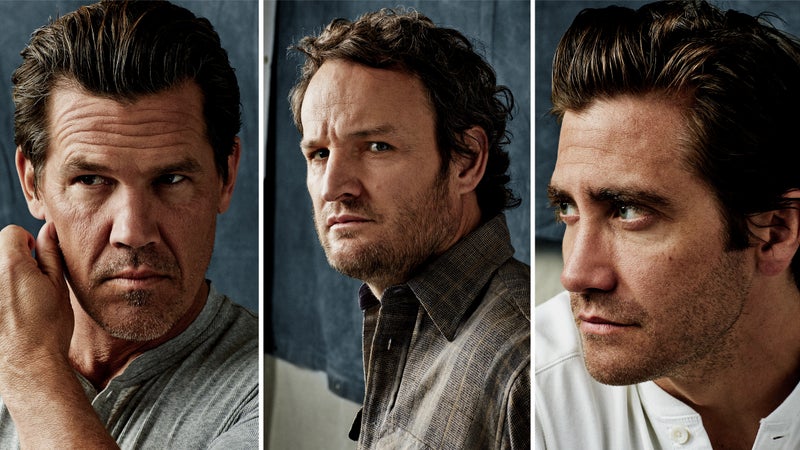
After Bale passed, the filmmakers approached Aussie Jason Clarke for Hall’s role. Clarke was an ideal get—a critically acclaimed leading man with gravitas, but not such a huge celebrity that he would eclipse an ensemble cast. Soon they also confirmed Josh Brolin to play Weathers; Robin Wright as Weathers’s wife, Peach; Emily Watson as �����ԹϺ��� Consultants Base Camp manager Helen Wilton; and John Hawkes as Hall’s client Doug Hansen. Academy Award nominees Jake Gyllenhaal and Keira Knightley soon followed.
JAKE GYLLENHAAL: For an actor, there is something appealing about putting physicality into your role, where you’re actually experiencing something and not just faking it. There was a good deal of stage work, but a lot of it was out in the open: shooting in the environments, not being able to breathe, struggling and helping each other in different ways. You’re not separated from the process—you’re actually working with the crew as if you’re on an expedition. That, to me, was one of the most interesting parts of it. Baltasar promised an experience, not just making a movie. We were all together with this sense of family, the way maybe people used to make movies. I think that’s the way people go on expeditions, and it’s the way people should make movies. But it rarely happens that way.
JOSH BROLIN: Balt seduced us with the way he wanted to approach this. He said, As much as a production company can document what you guys are going through as these characters, we’re going to try to be as true to that as possible. Obviously, we’re not going to go to the top of Everest, but we do want to go to Nepal, we do want to climb to Base Camp. So all that stuff was very attractive.
JASON CLARKE: The more time you spend on a mountain, or doing anything dangerous, the more you have respect for those who do it. They’re not stupid. If they’ve done it more than once, they understand the risks. The closer you get to it, the more you understand that there’s a randomness to it. The more time you spend in hard circumstances, the less willing you are to judge, to make accusations. It’s some rare air.
BROLIN: The people I know who are actual mountaineers, they beat to a different drum. There are lots of demons there. Something pushes them to do something that dangerous with that kind of percentage of not making it—it takes a certain kind of person. It’s like big-wave surfers, like Laird Hamilton. I’m sure he’s a normal guy, but not normal like you and me.
Location, Location
Most of the shooting took place in early 2014, starting in January in Nepal, where scenes were filmed in Kathmandu and in the Khumbu Valley, on the route to Base Camp. Next, the crew relocated to the Dolomites, in Italy, where they re-created high camps and some of the upper-mountain action. The actors and crew stayed at the and shared meals in mess tents. Eleven Sherpas also traveled to Italy with Breashears. For several Sherpas, it was their first time abroad. Cotter was there to manage mountain safety.
�������Á������: I believe that if you are going to make a film that will live and last, a viewer has to feel it. It’s like a sci-fi movie. If it’s cheap, they know. You have to sell it on a certain level. Audiences are really savvy. I don’t want to make a half-cooked movie and have everyone laughing at me.
COTTER: When we went to Italy, the Dolomites were having their worst winter in 40 years. If you were a skier, you’d say it was the best winter in 40 years. But for making a movie, it was really challenging. Here we are, trying to re-create scenes on the windswept summit of Everest, and we’ve got waist-deep snow to deal with. It was extremely challenging trying to work in that environment. We’d have to ski-pack the slope and water it down before we could get the climbers out onto it, and then we’d be breaking through the crust.
CLARKE: It was a monumental effort. Our base camp was at 11,000 feet, and we’re shooting at 12,000 to 13,000 feet. You’re surrounded by people in the cold and the weather, with choppers dropping bombs to get rid of the avalanche danger.
Character Studies
When we met in Los Angeles, Clarke, Gyllenhaal, and Brolin were genuinely enthused to be together again, trading adventure stories like old friends reminiscing about an expedition. The actors had immersed themselves in the roles—training physically, interviewing the survivors, and speaking with the friends and families of the deceased. Clarke went trekking on New Zealand’s Tasman Glacier, a common stomping ground for Hall, and spent hours talking with Hall’s wife. Those familiar with the actual events may kvetch that Gyllenhaal’s Scott Fischer sports dark hair and a full beard, unlike the real man, who was blond and typically clean shaven. But Gyllenhaal is still convincing, and his Fischer comes across as a likable high-altitude bro, much like the late guide.
GYLLENHAAL: I didn’t want to make Scott Fischer into this guy who was some ambitious, reckless person. It was too simple and not true. He was an extraordinarily loving guy. His kids went back and retraced his steps to Base Camp. There was so much love for this guy. And, generally, what I could tell was that he had been painted in a certain way. It was important for me to portray him as human. It wasn’t all about trying to compete with Rob.
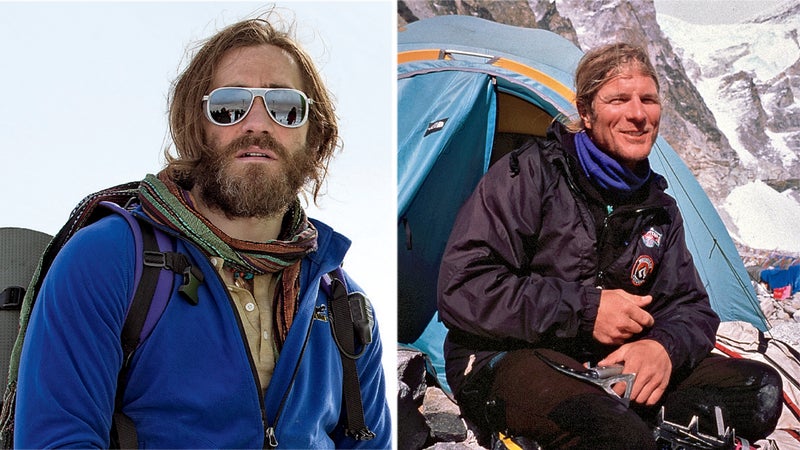
BROLIN: The thing with Beck is that he’d done so many public appearances, it became a TED Talk. It was no longer personal. That type of story didn’t give me anything. Then, once we started talking more, and I started e-mailing with him, emotions started to come out. That’s what made it all worth it for me. It was like, Yeah, what was it like and what can you remember if you go back to that place? It’s almost impossible to go back to that time. It’s incredibly terrifying.
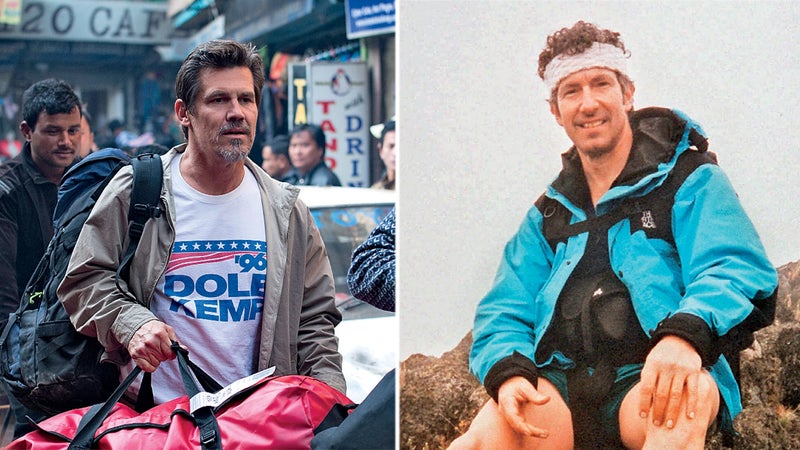
GYLLENHAAL: Your brain, at a chemical level, is another thing you have to take into account. They were having to make moral choices at 28,000 feet, an area where the body does not function. Let’s be honest: when you’re trying to make a functional decision, and justify what your character does at sea level, it doesn’t work. Josh and I went in the [altitude] simulator, and we stayed in there too long because we were enjoying ourselves. We were between 26,000 and 36,000 feet.
BROLIN: I think the people who were working the controls were a little worried!
GYLLENHAAL: Three days after that, we were in a severe depression.
BROLIN: I remember in rehearsals I was like, “I don’t feel right, do you feel right?”
GYLLENHAAL: So when you try to justify what is a moral decision [at extreme altitude], there is the half of it that is chemical. Ultimately, there is a massive factor that we don’t often think about—which is, none of us really know what it’s like until you’re up that high.
CLARKE: It all comes down to these little moments. I was obsessed with trying to understand who was where and what the timeline was. These are questions you ask as an actor.
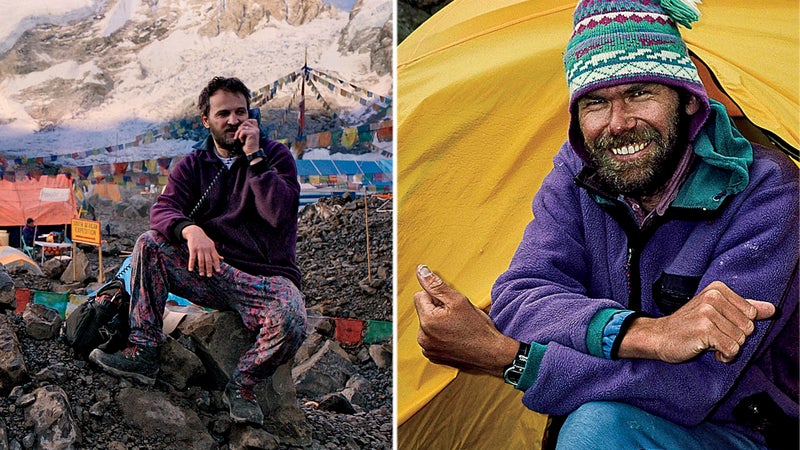
GYLLENHAAL: Most of all, what I really loved about Scott was his Spandex pants.
CLARKE: Your buns were tight! They were, dude!
Getting the Shot
Because Kormákur was determined to make the film believable, he developed a reputation on set as a bit of a cowboy, pushing his actors through long days, sometimes in grueling conditions. In the mountains, he might stroll up to the edge of a precipice or decide to shoot at an angle that required a lengthy, precarious setup. But he often got the footage he wanted.
GYLLENHAAL: Balt would do this thing where he would try to find a location. He’s pure Viking. He’d just go [walks across room] and look over, it would be like a thousand-foot drop, and you’d see all the advisers be like, “Gah! Fuck! There’s no safety line!” And he’d step to the edge and be like, “Let’s just put the camera down here.” And they’re like, “Balt, that will take five hours,” and he’s like, “What, just give me the camera.” He’d lower it down, and he’d be like, “Jake, just go down there.”
COTTER: He told me at one point that he is practically immortal. So, you know, that presents some challenges when you’re trying to work in a safe environment.
Stagecraft
During the spring of 2014, the movie’s final scenes were shot on soundstages at the Cinecitta Studios in Rome, where filmmakers painstakingly reconstructed Base Camp, and in London’s legendary Pinewood Studios, where Everest’s summit and high ridges were simulated. During shooting it wasn’t unusual to see a Sherpa with several Everest climbs to his name sitting on a synthetic summit in front of a green screen, reading a script. To re-create blizzard conditions, Kormákur procured “all the salt in London” to blow onto the set and into the actors’ faces. The upshot: the film’s high-altitude survival scenes are more convincing and realistic than anything Hollywood has ever produced.
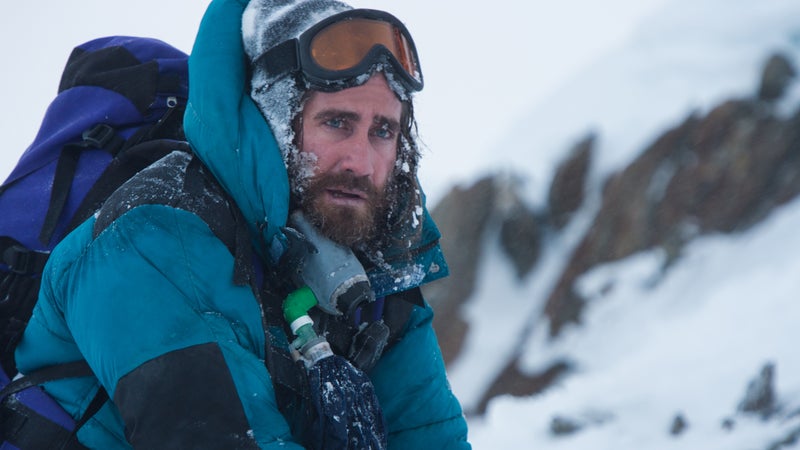
BREASHEARS: What they had done in Cinecitta, where they built Base Camp, was stunning. The Sherpas had brought along all the old gear that a lot of us had stored from ’96. We had old pots and pans, old tents. We purchased stuff from others who had mothballed old climbing gear. Same with the art director, wardrobe and costume, and the person in charge of props. They came to Nepal on the initial scout. In Thamel [a neighborhood in Kathmandu], we found ice axes from that period, we hunted down old Koflach boots and had old down suits made, because there weren’t enough that we could find. We’d walk to an upper floor or a back room of these shops and find an old oxygen bottle or a mask or a set of crampons. This was all being built and set up while we were in Val Senales. Base Camp was built in this giant holding tank with 30 or 40 loads of rock. When I showed up with the Sherpas, they came around the corner, and one by one they just stopped and stared. They were like, What is Base Camp doing here?
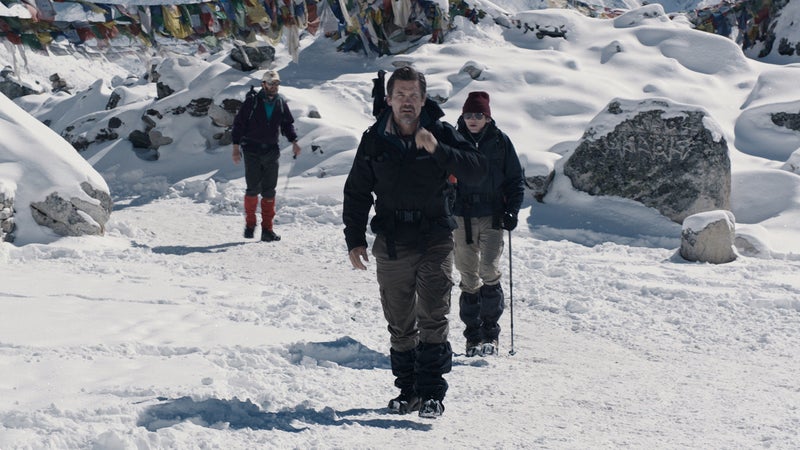
GYLLENHAAL: We get to the summit, which is on stage, and I guess what looked the best was the salt. Balt really wanted me to look sick, and he asked the effects guys to spray all the salt and bounce it up into my eyes. So over the course of this scene, my eyes started to swell up, and I was snotting. There was so much snot. Balt kept yelling, “Open your eyes! Open your eyes!” It took like four or five hours to feel OK again.
CLARKE: There’s a guy [on the crew] shoveling salt into a fan to simulate us going up the Lhotse Face, and all of a sudden he loses it. He’s got this shovel going and he’s like, “Motherfucker! Fuck this! Fuck you and your fucking fan!” When you’re shoveling a 15-minute take, it’s really intensive. There was a lot of labor on this shoot—big, full-on days. You earned your bottle of wine.
BROLIN: On stage, you’re wearing what you wore in the mountains, these big parkas. You’re wearing crampons in your trailer, and you leave and you’re scraping across the concrete parking lot. [Makes scraping noise]
CLARKE: You’re worried that you don’t look right in a hundred-mile-an-hour windstorm. You’re yelling, “Do I look OK here? Somebody help me out. Does this look right? Can we get that fan on me, please!”
Will it Play in Peoria?
Mount Everest’s narrative has changed since the events of 1996; natural disasters in Nepal and the plight of the Sherpas have become the new stories. One of Everest’s film crews, directed by climber and filmmaker Kent Harvey, was in Base Camp in 2014, shooting landscapes and long-range images, when the devastating avalanche that killed 16 Sherpas occurred. Three of the victims were working for Cotter’s company �����ԹϺ��� Consultants on a commercial expedition, unrelated to the film. Mountain conditions remained unstable, and eventually the season was abandoned. Then this year, just two weeks after our interview, a series of powerful earthquakes leveled mountain villages, causing widespread destruction and killing thousands, including 18 people on Everest. Though filming had been wrapped for a year when the earthquakes occurred, the movie arrives in the wake of the tragedy as Nepal struggles to rebuild. The producers have been sensitive to the events, and trailers for the film include donation requests for the country’s recovery effort. Yet, as conspicuous as the movie’s timing may be, the public’s fascination with peril at the top of the world has never waned.
BEVAN: I think people will be surprised by an Everest movie. Audiences love true stories. There’s a wealth of material in true adventure stories; it’s an untapped genre. And with special effects, you can do anything now. The effects that interest me are not the guy flying through the sky, but creating reality—reality that you otherwise can’t go and shoot.
BREASHEARS: I think the film has a lot of integrity as to how it portrays a seminal event in the history of mountaineering. And one of the public’s first looks at what could happen on a big mountain when things go wrong. This has been a long haul for me, and it’s an experience I treasure.
BEVAN: I’m glad that the project took so long, because the right director made this movie. Baltasar was absolutely the right guy. He has had an outdoor life, and he’s a very good filmmaker. He does great with action films but also with drama. He had all the right ingredients.
�������Á������: I’m not a mountain climber, but I ride horses on the highlands in Iceland every summer. I think the transformation is exactly the same with climbers. You get rawer and rawer, and you peel off the layers. I like that about Beck’s story. He’s just opening up at the beginning of the journey. That’s what journeys are for me—they open you up. It’s the real you.
COTTER: Working on this movie took me back 20 years. Probably the most moving scene for me personally is the one where all the surviving climbers come back into Base Camp and are met by us—myself, Carolyn McKenzie, Helen Wilton, and others. To actually witness a moment of my life being replayed in front of me was quite surreal.
Contributing editor Nick Heil () wrote about fat bikes in the August issue.


